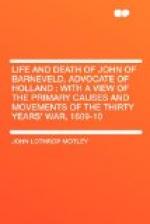It is not unfrequent to find four or five important despatches compressed almost in miniature upon one sheet of gigantic foolscap. It is also curious to find each one of these rough drafts conscientiously beginning in the statesman’s own hand with the elaborate phrases of compliment belonging to the epoch such as “Noble, strenuous, severe, highly honourable, very learned, very discreet, and very wise masters,” and ending with “May the Lord God Almighty eternally preserve you and hold you in His holy keeping in this world and for ever”—decorations which one might have thought it safe to leave to be filled in by the secretary or copying clerk.
Thus there have been few men at any period whose lives have been more closely identical than his with a national history. There have been few great men in any history whose names have become less familiar to the world, and lived less in the mouths of posterity. Yet there can be no doubt that if William the Silent was the founder of the independence of the United Provinces Barneveld was the founder of the Commonwealth itself. He had never the opportunity, perhaps he might have never had the capacity, to make such prodigious sacrifices in the cause of country as the great prince had done. But he had served his country strenuously from youth to old age with an abiding sense of duty, a steadiness of purpose, a broad vision, a firm grasp, and an opulence of resource such as not one of his compatriots could even pretend to rival.
Had that country of which he was so long the first citizen maintained until our own day the same proportionate position among the empires of Christendom as it held in the seventeenth century, the name of John of Barneveld would have perhaps been as familiar to all men as it is at this moment to nearly every inhabitant of the Netherlands. Even now political passion is almost as ready to flame forth either in ardent affection or enthusiastic hatred as if two centuries and a half had not elapsed since his death. His name is so typical of a party, a polity, and a faith, so indelibly associated with a great historical cataclysm, as to render it difficult even for the grave, the conscientious, the learned, the patriotic of his own compatriots to speak of him with absolute impartiality.
A foreigner who loves and admires all that is great and noble in the history of that famous republic and can have no hereditary bias as to its ecclesiastical or political theories may at least attempt the task with comparative coldness, although conscious of inability to do thorough justice to a most complex subject.
In former publications devoted to Netherland history I have endeavoured to trace the course of events of which the life and works of the Advocate were a vital ingredient down to the period when Spain after more than forty years of hard fighting virtually acknowledged the independence of the Republic and concluded with her a truce of twelve years.




